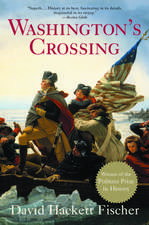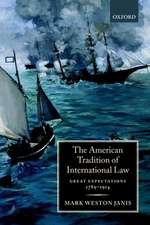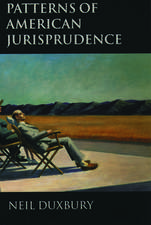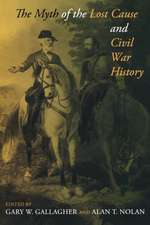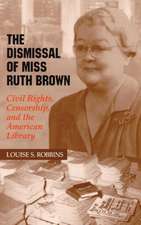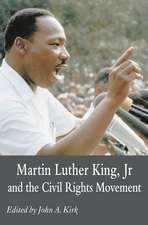1863: The Rebirth of a Nation
Autor Joseph E. Stevensen Limba Engleză Paperback – 30 sep 2000
Integrating the events of this epochal year into a panoramic narrative, Joseph E. Stevens presents a grand portrait of the Union and Confederacy at war. He captures two nations struggling to define the American experiment and create a new understanding of freedom on the bloody battlefields of Stones River, Chancellorsville, Gettysburg, Vicksburg, Chickamauga, and Chattanooga. He also traces the astonishing political, economic, and social transformations that marked 1863 as a watershed.
1863 features a remarkable cast of characters: larger-than-life leaders like Abraham Lincoln and Jefferson Davis; charismatic and controversial military commanders like Robert E. Lee, Ulysses S. Grant, James Longstreet, Joseph Hooker, Stonewall Jackson, George Armstrong Custer, and Nathan Bedford Forrest; avaricious young capitalists like Andrew Carnegie, John D. Rockefeller, and J. P. Morgan; war-haunted writers like Herman Melville, Louisa May Alcott, and Walt Whitman; war-inspired painters like Winslow Homer and Conrad Wise Chapman.
Here, too, is a host of less well known but no less fascinating personalities: soldiers and civilians, slaves and slave owners, farmers and city dwellers, politicians and profiteers, artistocrats and refugees. Their stories—humorous and harrowing, inspiring and appalling—make 1863 not just a sweeping re-creation of events but a gripping human tale as well.
1863 is popular history at its best—vivid, vibrant, and immensely readable. Written with dramatic intensity and impassioned humanity, it is a thrilling account of the pivotal year of the war that remains the central historical event in the life of our nation.
Preț: 194.93 lei
Nou
Puncte Express: 292
Preț estimativ în valută:
37.30€ • 38.54$ • 31.05£
37.30€ • 38.54$ • 31.05£
Carte tipărită la comandă
Livrare economică 22-28 martie
Preluare comenzi: 021 569.72.76
Specificații
ISBN-13: 9780553378368
ISBN-10: 0553378368
Pagini: 464
Dimensiuni: 156 x 233 x 24 mm
Greutate: 0.64 kg
Editura: Bantam
ISBN-10: 0553378368
Pagini: 464
Dimensiuni: 156 x 233 x 24 mm
Greutate: 0.64 kg
Editura: Bantam
Recenzii
Advance praise for 1863: The Rebirth of a Nation:
"The year 1863 was the hinge of fate not only for the outcome of the Civil War, but indeed for the destiny of America. Starting in the gloom of defeat forth Union cause and prospect of victory of the Confederacy, this Year of Jubilee for slaves freed by the Emancipation Proclamation was punctuated by historic Northern victories at Gettysburg, Vicksburg, and Chattanooga, and ended in and ended in an apparent reversal of fortunes for North and South. Joseph Stevens's vigorous prose captures the drama and significance of this year of decision in a stunning and important book."
--James M. McPherson, Pulitzer Prize-winning author of Battle Cry of Freedom
"1863: The Rebirth of a Nation portrays the remarkable events of that pivotal year in a style that is accurate, readable and rich in human interest. I have read a good deal about the Battle of Gettysburg, but Joseph Stevens kept me riveted with his new treatment of old stories."
--John S.D. Eisenhower, author of Agent of Destiny: The Life and Times of General Winfield Scott
"An energetic, gripping popular history from which readers will gain a panoramic view of this historical turning point."
--Publishers Weekly
"A highly accessible chronicling of the Civil War's pivotal year."
--Kirkus Reviews
"The year 1863 was the hinge of fate not only for the outcome of the Civil War, but indeed for the destiny of America. Starting in the gloom of defeat forth Union cause and prospect of victory of the Confederacy, this Year of Jubilee for slaves freed by the Emancipation Proclamation was punctuated by historic Northern victories at Gettysburg, Vicksburg, and Chattanooga, and ended in and ended in an apparent reversal of fortunes for North and South. Joseph Stevens's vigorous prose captures the drama and significance of this year of decision in a stunning and important book."
--James M. McPherson, Pulitzer Prize-winning author of Battle Cry of Freedom
"1863: The Rebirth of a Nation portrays the remarkable events of that pivotal year in a style that is accurate, readable and rich in human interest. I have read a good deal about the Battle of Gettysburg, but Joseph Stevens kept me riveted with his new treatment of old stories."
--John S.D. Eisenhower, author of Agent of Destiny: The Life and Times of General Winfield Scott
"An energetic, gripping popular history from which readers will gain a panoramic view of this historical turning point."
--Publishers Weekly
"A highly accessible chronicling of the Civil War's pivotal year."
--Kirkus Reviews
Notă biografică
Joseph E. Stevens's first book, Hoover Dam: An American Adventure, received the John H. Dunning Prize of the American Historical Association, the W. Turrentine Jackson Prize of the Western History Association, and the Western Writers of America's Spur Award. He is also the author of the critically acclaimed America's National Battlefield Parks. He lives in Santa Fe, New Mexico.
Extras
Blow Ye the Trumpet, Blow
January 1, 1863, was a crisp, sparkling day in Washington. A throng of holiday promenaders strolled along Pennsylvania Avenue enjoying the fresh breezes and brilliant sunshine. The air was alive with the tinkle of organ grinders playing "Ben Bolt" and "Captain Jinks," the cries of street vendors hawking rock candy and roasted chestnuts, the shouts of drivers jockeying their rigs through the crush of traffic on the muddy boulevard. Eager bootblacks scurried to and fro, polishing the shoes of sauntering swells, while on every street corner leather-lunged newsboys bawled the morning dailies. Here and there ex-soldiers with empty sleeves or trouser legs panhandled for money, but the passing pedestrians paid them little heed, ambling cheerfully down the broad sidewalks, "each and all seeming bent on the enjoyment of the festivities of the day according to their varying tastes and fancies."
For some that meant going to Gautier's, Hammack's, or Wormley's restaurant to feast on platters of pâté de foie gras, stewed terrapin, and fried Chesapeake oysters. For others it meant attending a matinee performance at Grover's National Theater, where Miss Lucille Western, the "pearl of the American stage," was appearing in "Cynthia the Gipsy, or The Flower of the Forest." For still others--off-duty army and navy officers, mostly--it meant guzzling ten-cent cocktails in the boisterous barroom at Willard's Hotel, playing faro or chuck-a-luck in one of the gambling halls on Pennsylvania Avenue's seedy south side, or dropping by one of the scores of bawdy houses located in the flourishing red-light district between Ninth and Fifteenth Streets.
The most popular destination, however, was 1600 Pennsylvania Avenue. Thousands of Washingtonians congregated there to take part in a holiday tradition almost as old as the Republic itself--shaking the hand of the president at the annual New Year's reception. Well before noon, the hour at which the White House would be opened to the public, a great crowd had gathered in Lafayette Square to watch the cream of Washington officialdom--the members of the diplomatic corps, the justices of the Supreme Court, the generals and admirals of the armed forces--arrive to pay their respects to Mr. Lincoln.
One after another the gleaming black carriages rolled up the avenue, turned into the White House drive, rattled to a stop beside the north portico, and discharged their loads of ambassadors, ministers, and chargés d'affaires onto the sun-splashed gravel. They were followed by the members of the judiciary, led by tottering eighty-five-year-old Chief Justice Roger B. Taney, author of the infamous Dred Scott decision, which had done so much to assure the outbreak of hostilities between North and South. The heirs to those hostilities, the high-ranking officers of the army and navy, came next, strutting into the mansion in an auriferous blaze of braid and epaulets.
Finally, at twelve o'clock precisely, it was time for the ordinary citizenry to be received. The gates swung open, and the huge crowd surged forward, swamping the twenty-man detail of District police that had been posted on the White House grounds to keep order. In a welter of torn coattails and crushed bonnets, the excited mob fetched up against the north entry, where a beardless youth in an ill-fitting uniform was standing guard. This military cerberus brandished his rifle and exclaimed in a squeaky voice: "My gosh! Gentlemen, will you stan' back? You can't get in no faster by crowdin'!" To which appeal, an amused newspaperman reported, "the gay and festive crowd responded by flattening him against a pilaster, never letting him loose until his fresh country face was dark with an alarming symptom of suffocation."
Once inside, the visitors removed their hats and gloves, adjusted wrinkled clothing, rearranged windblown hair, and gaped with undisguised curiosity at the lavish new interior furnishings recently installed by Mrs. Lincoln. The public rooms had been completely redone. Gone were the frayed curtains, the swaybacked settees, the grimy rugs that had created an atmosphere so dingy it had reminded one guest of "the breaking up of a hard winter about a deserted homestead." In their place were plush draperies of tasseled Parisian brocatelle, ornately carved rosewood chairs upholstered in crimson satin, and exquisite Wilton weave carpets into which designs of fruit and flowers had been braided. The first lady had exceeded her $20,000 "repairs" budget by $6,700, exasperating the president, who declared it a monstrous extravagance to spend such sums on "flub dubs for that damned old house." But most in the receiving line that now extended from the entry vestibule into the main hall, to the Blue Room, and thence to the East Room, agreed that Mrs. Lincoln's interior decorating added a thrilling touch of glamour to levees such as this.
In the midst of all the splendor, the gangling, plainly dressed president looked sadly out of place. "To say he is ugly is nothing; to add that his figure is grotesque is to convey no adequate impression," marveled an English journalist. "Fancy a man about six feet high, and thin in proportion, with long bony arms and legs, which somehow seem always to be in the way; with great rugged furrowed hands, which grasp you like a vice when shaking yours; with a long scraggy neck and chest too narrow for the great arms at his side. . . . Clothe this figure then in a long, tight, badly-fitting suit of black, creased, soiled, and puckered up at every salient point of the figure (and every point of this figure is salient), put on large, ill-fitting boots, gloves too long for the bony fingers . . . and then add to all this an air of strength, physical as well as moral, and a strange look of dignity, coupled with all the grotesqueness, and you will have the impression left upon me by Abraham Lincoln."
The president stood by a small table in the center of the Blue Room, shaking hands "like a man pumping for life on a sinking vessel." He nodded and spoke as each person was introduced to him, but his eyes were restless, and he gazed over the heads of the people crowding into the small chamber as though searching for something far away.
Perhaps he was brooding about the Emancipation Proclamation, which he would sign later in the day, wondering how it would be received by a public still reeling from the Army of the Potomac's terrible defeat at Fredericksburg two weeks ago. Or perhaps he was thinking about the message received earlier that morning informing him that the Army of the Cumberland was fighting a pitched battle in middle Tennessee. He wanted to believe that Federal forces would prevail, but he feared the worst. Another bloody setback coming so soon after Fredericksburg could shatter what was left of Northern morale and bring the war to an abrupt and ignominious conclusion. With these gloomy thoughts running through his mind, he was hard-pressed to keep a smile on his face and summon a few polite words for the well-wishers who kept filing past him.
At 2 p.m. the reception finally ended. As the last batch of callers straggled out through the East Room, exiting by way of an open floor-to-ceiling window, Lincoln heaved a sigh of relief and went upstairs to his office, where a small delegation of officials, headed by Secretary of State William Seward, was waiting for him. A five-page manuscript, carefully engrossed by a State Department scrivener, had been spread on the cabinet table. With a grunt Lincoln settled into his armchair, picked up the sheets, and read: "By the President of the United States of America: A Proclamation . . . to wit: That on the first day of January, in the year of our Lord one thousand eight hundred and sixty-three . . . I do order and declare . . . that all persons held as slaves within any state or designated part of a state, the people whereof shall then be in rebellion against the United States, shall be then, thenceforward, and forever free."
As a piece of prose it was singularly uninspiring. A disenchanted historian would later say that it "had all the moral grandeur of a bill of lading." Yet it was destined to take its place beside the Declaration of Independence and the Constitution as one of the epochal documents of American history. Lincoln was keenly aware of this. "If my name ever goes into history, it will be for this act," he said to Seward as he carefully proofread the papers he held in his hands. But what, he wondered, would be posterity's verdict on the Emancipation Proclamation? Would it be remembered as the pathetic last gasp of a failed leader, or would it be celebrated as a noble edict that freed 4 million people and provided moral justification for the obscene bloodshed of this dreadful war? He did not know. But of two things he was sure: first, if slavery was not wrong, then nothing was wrong; and second, if he did not use every means at hand to save the Union, then he was unworthy of his office.
He put the proclamation back on the table and reached for his pen, savoring the moment. At long last he was going to strike in public at something he had always detested in private. He hated slavery viscerally, had done so since his youth when the sight of blacks chained together "like so many fish upon a trot-line" had sickened him. He hated it on an intellectual level, too, considering it a moral abomination that deprived America's "republican example of its just influence in the world--enables the enemies of free institutions, with plausibility, to taunt us as hypocrites." Human bondage made a mockery of the Declaration of Independence, which was the wellspring of his political beliefs. It contradicted the fundamental assertion that all men are created equal, and it thwarted America from carrying out what he believed was its great historical mission--to advance the cause of liberty and democratic self-government around the globe.
As much as he loathed slavery and deplored what it had done to the country, the decision to abolish it had been a difficult one. Would emancipation lead Union soldiers to desert en masse, as many prophesied? Would it goad the slaveholding border states into casting their lot with the Confederacy? And what of the ex-slaves? Was America ready for the social convulsion that was sure to come when 4 million Negroes sought freedom's inevitable corollary, equality? Would the price of universal freedom be eternal racial strife?
Lincoln had responded to arguments for and against emancipation by bluntly restating his war aims. The paramount object was to save the Union, he insisted; his policy on slavery would be formulated with that goal in mind.
It was an inescapable fact that slaves constituted more than half the Confederacy's workforce. They raised food, manufactured munitions, hauled supplies, and dug fortifications, enabling the South to field a much larger army than would otherwise have been possible. If he took the toil of these laborers from the rebels, he would severely weaken their ability to wage war.
Equally important to Lincoln's way of thinking was the political and psychological impact of emancipation. Just as Federal armies were arrayed against Confederate forces in the field, so he was pitted against the rebel president in Richmond, engaging in a war of words, the objective of which was to seize and hold the moral high ground. The importance of this war-within-a-war could not, he believed, be underestimated. The power of public sentiment to sustain a seemingly hopeless cause had been demonstrated during the American Revolution, when the rallying cry of liberty had inspired the colonists to fight on against the stronger, better-equipped British until France entered the fray.
The analogies that could be drawn between that conflict and this one made Lincoln exceedingly uncomfortable. When Jefferson Davis trumpeted that the Confederacy stood for independence while the Union stood for tyranny, when he cast himself as Washington to Lincoln's George III, he was gaining the upper hand in the struggle of images and ideas. Lincoln knew the only way to counterattack was to raise high the banner of emancipation and transform the war from a struggle against secession, an undertaking that smacked of subjugation, to a crusade for human freedom, an endeavor consecrated by America's revolutionary heritage. By defining the enemy cause as slavery rather than independence, he would strengthen Northern resolve and make it all but impossible for the governments of Britain and France to intervene on behalf of the South. Forced to depend on its own limited resources, the Confederacy must eventually be crushed by the weight of Northern numbers.
He knew his critics would argue that emancipation by executive fiat was patently unconstitutional. They would say that by flouting that sacred document, he was, in effect, enslaving whites to free blacks. His response to the first charge was that emancipation was a military necessity essential to the preservation of the Union and therefore an action he was entitled to take as commander in chief.
As for the second accusation, he could not deny that it had a demagogic ring to it, but clearly he was not taking liberty from whites in order to give it to blacks. Rather, he was emancipating the slaves so that whites might restore the Union, thereby saving their democratic institutions and perpetuating their republican freedoms. "Must a government, of necessity, be too strong for the liberties of its own people, or too weak to maintain its own existence?" he had asked shortly after the war began. This proclamation was his answer. The struggle of today was not altogether for today. It was for a vast future also, and so extraordinary measures were necessary, including emancipation, so that America might have a chance to realize the Founders' dream of a permanent democracy based on the principles of liberty and equality.
He dipped the pen in an inkwell, but as he held it over the parchment sheets, his arm began to quiver. Grimacing, he flexed his fingers and massaged his shoulder. "I never, in my life, felt more certain that I was doing right than I do in signing this paper," he said apologetically to the small crowd of witnesses gathered about the cabinet table. "But I have been shaking hands since nine o'clock this morning 'til my arm is stiff and numb. Now this signature is one that will be closely examined, and if they find my hand trembled they will say, 'He had some compunctions.' But anyway, it is going to be done."
And with that he slowly, firmly wrote out his full name.
Setting the pen down, he looked anxiously at the glistening signature. It was a little tremulous, he fretted, but then, as if a heavy weight had been lifted from his shoulders, he relaxed, settled back into his chair, and murmured in a voice just loud enough to be heard: "That will do."
January 1, 1863, was a crisp, sparkling day in Washington. A throng of holiday promenaders strolled along Pennsylvania Avenue enjoying the fresh breezes and brilliant sunshine. The air was alive with the tinkle of organ grinders playing "Ben Bolt" and "Captain Jinks," the cries of street vendors hawking rock candy and roasted chestnuts, the shouts of drivers jockeying their rigs through the crush of traffic on the muddy boulevard. Eager bootblacks scurried to and fro, polishing the shoes of sauntering swells, while on every street corner leather-lunged newsboys bawled the morning dailies. Here and there ex-soldiers with empty sleeves or trouser legs panhandled for money, but the passing pedestrians paid them little heed, ambling cheerfully down the broad sidewalks, "each and all seeming bent on the enjoyment of the festivities of the day according to their varying tastes and fancies."
For some that meant going to Gautier's, Hammack's, or Wormley's restaurant to feast on platters of pâté de foie gras, stewed terrapin, and fried Chesapeake oysters. For others it meant attending a matinee performance at Grover's National Theater, where Miss Lucille Western, the "pearl of the American stage," was appearing in "Cynthia the Gipsy, or The Flower of the Forest." For still others--off-duty army and navy officers, mostly--it meant guzzling ten-cent cocktails in the boisterous barroom at Willard's Hotel, playing faro or chuck-a-luck in one of the gambling halls on Pennsylvania Avenue's seedy south side, or dropping by one of the scores of bawdy houses located in the flourishing red-light district between Ninth and Fifteenth Streets.
The most popular destination, however, was 1600 Pennsylvania Avenue. Thousands of Washingtonians congregated there to take part in a holiday tradition almost as old as the Republic itself--shaking the hand of the president at the annual New Year's reception. Well before noon, the hour at which the White House would be opened to the public, a great crowd had gathered in Lafayette Square to watch the cream of Washington officialdom--the members of the diplomatic corps, the justices of the Supreme Court, the generals and admirals of the armed forces--arrive to pay their respects to Mr. Lincoln.
One after another the gleaming black carriages rolled up the avenue, turned into the White House drive, rattled to a stop beside the north portico, and discharged their loads of ambassadors, ministers, and chargés d'affaires onto the sun-splashed gravel. They were followed by the members of the judiciary, led by tottering eighty-five-year-old Chief Justice Roger B. Taney, author of the infamous Dred Scott decision, which had done so much to assure the outbreak of hostilities between North and South. The heirs to those hostilities, the high-ranking officers of the army and navy, came next, strutting into the mansion in an auriferous blaze of braid and epaulets.
Finally, at twelve o'clock precisely, it was time for the ordinary citizenry to be received. The gates swung open, and the huge crowd surged forward, swamping the twenty-man detail of District police that had been posted on the White House grounds to keep order. In a welter of torn coattails and crushed bonnets, the excited mob fetched up against the north entry, where a beardless youth in an ill-fitting uniform was standing guard. This military cerberus brandished his rifle and exclaimed in a squeaky voice: "My gosh! Gentlemen, will you stan' back? You can't get in no faster by crowdin'!" To which appeal, an amused newspaperman reported, "the gay and festive crowd responded by flattening him against a pilaster, never letting him loose until his fresh country face was dark with an alarming symptom of suffocation."
Once inside, the visitors removed their hats and gloves, adjusted wrinkled clothing, rearranged windblown hair, and gaped with undisguised curiosity at the lavish new interior furnishings recently installed by Mrs. Lincoln. The public rooms had been completely redone. Gone were the frayed curtains, the swaybacked settees, the grimy rugs that had created an atmosphere so dingy it had reminded one guest of "the breaking up of a hard winter about a deserted homestead." In their place were plush draperies of tasseled Parisian brocatelle, ornately carved rosewood chairs upholstered in crimson satin, and exquisite Wilton weave carpets into which designs of fruit and flowers had been braided. The first lady had exceeded her $20,000 "repairs" budget by $6,700, exasperating the president, who declared it a monstrous extravagance to spend such sums on "flub dubs for that damned old house." But most in the receiving line that now extended from the entry vestibule into the main hall, to the Blue Room, and thence to the East Room, agreed that Mrs. Lincoln's interior decorating added a thrilling touch of glamour to levees such as this.
In the midst of all the splendor, the gangling, plainly dressed president looked sadly out of place. "To say he is ugly is nothing; to add that his figure is grotesque is to convey no adequate impression," marveled an English journalist. "Fancy a man about six feet high, and thin in proportion, with long bony arms and legs, which somehow seem always to be in the way; with great rugged furrowed hands, which grasp you like a vice when shaking yours; with a long scraggy neck and chest too narrow for the great arms at his side. . . . Clothe this figure then in a long, tight, badly-fitting suit of black, creased, soiled, and puckered up at every salient point of the figure (and every point of this figure is salient), put on large, ill-fitting boots, gloves too long for the bony fingers . . . and then add to all this an air of strength, physical as well as moral, and a strange look of dignity, coupled with all the grotesqueness, and you will have the impression left upon me by Abraham Lincoln."
The president stood by a small table in the center of the Blue Room, shaking hands "like a man pumping for life on a sinking vessel." He nodded and spoke as each person was introduced to him, but his eyes were restless, and he gazed over the heads of the people crowding into the small chamber as though searching for something far away.
Perhaps he was brooding about the Emancipation Proclamation, which he would sign later in the day, wondering how it would be received by a public still reeling from the Army of the Potomac's terrible defeat at Fredericksburg two weeks ago. Or perhaps he was thinking about the message received earlier that morning informing him that the Army of the Cumberland was fighting a pitched battle in middle Tennessee. He wanted to believe that Federal forces would prevail, but he feared the worst. Another bloody setback coming so soon after Fredericksburg could shatter what was left of Northern morale and bring the war to an abrupt and ignominious conclusion. With these gloomy thoughts running through his mind, he was hard-pressed to keep a smile on his face and summon a few polite words for the well-wishers who kept filing past him.
At 2 p.m. the reception finally ended. As the last batch of callers straggled out through the East Room, exiting by way of an open floor-to-ceiling window, Lincoln heaved a sigh of relief and went upstairs to his office, where a small delegation of officials, headed by Secretary of State William Seward, was waiting for him. A five-page manuscript, carefully engrossed by a State Department scrivener, had been spread on the cabinet table. With a grunt Lincoln settled into his armchair, picked up the sheets, and read: "By the President of the United States of America: A Proclamation . . . to wit: That on the first day of January, in the year of our Lord one thousand eight hundred and sixty-three . . . I do order and declare . . . that all persons held as slaves within any state or designated part of a state, the people whereof shall then be in rebellion against the United States, shall be then, thenceforward, and forever free."
As a piece of prose it was singularly uninspiring. A disenchanted historian would later say that it "had all the moral grandeur of a bill of lading." Yet it was destined to take its place beside the Declaration of Independence and the Constitution as one of the epochal documents of American history. Lincoln was keenly aware of this. "If my name ever goes into history, it will be for this act," he said to Seward as he carefully proofread the papers he held in his hands. But what, he wondered, would be posterity's verdict on the Emancipation Proclamation? Would it be remembered as the pathetic last gasp of a failed leader, or would it be celebrated as a noble edict that freed 4 million people and provided moral justification for the obscene bloodshed of this dreadful war? He did not know. But of two things he was sure: first, if slavery was not wrong, then nothing was wrong; and second, if he did not use every means at hand to save the Union, then he was unworthy of his office.
He put the proclamation back on the table and reached for his pen, savoring the moment. At long last he was going to strike in public at something he had always detested in private. He hated slavery viscerally, had done so since his youth when the sight of blacks chained together "like so many fish upon a trot-line" had sickened him. He hated it on an intellectual level, too, considering it a moral abomination that deprived America's "republican example of its just influence in the world--enables the enemies of free institutions, with plausibility, to taunt us as hypocrites." Human bondage made a mockery of the Declaration of Independence, which was the wellspring of his political beliefs. It contradicted the fundamental assertion that all men are created equal, and it thwarted America from carrying out what he believed was its great historical mission--to advance the cause of liberty and democratic self-government around the globe.
As much as he loathed slavery and deplored what it had done to the country, the decision to abolish it had been a difficult one. Would emancipation lead Union soldiers to desert en masse, as many prophesied? Would it goad the slaveholding border states into casting their lot with the Confederacy? And what of the ex-slaves? Was America ready for the social convulsion that was sure to come when 4 million Negroes sought freedom's inevitable corollary, equality? Would the price of universal freedom be eternal racial strife?
Lincoln had responded to arguments for and against emancipation by bluntly restating his war aims. The paramount object was to save the Union, he insisted; his policy on slavery would be formulated with that goal in mind.
It was an inescapable fact that slaves constituted more than half the Confederacy's workforce. They raised food, manufactured munitions, hauled supplies, and dug fortifications, enabling the South to field a much larger army than would otherwise have been possible. If he took the toil of these laborers from the rebels, he would severely weaken their ability to wage war.
Equally important to Lincoln's way of thinking was the political and psychological impact of emancipation. Just as Federal armies were arrayed against Confederate forces in the field, so he was pitted against the rebel president in Richmond, engaging in a war of words, the objective of which was to seize and hold the moral high ground. The importance of this war-within-a-war could not, he believed, be underestimated. The power of public sentiment to sustain a seemingly hopeless cause had been demonstrated during the American Revolution, when the rallying cry of liberty had inspired the colonists to fight on against the stronger, better-equipped British until France entered the fray.
The analogies that could be drawn between that conflict and this one made Lincoln exceedingly uncomfortable. When Jefferson Davis trumpeted that the Confederacy stood for independence while the Union stood for tyranny, when he cast himself as Washington to Lincoln's George III, he was gaining the upper hand in the struggle of images and ideas. Lincoln knew the only way to counterattack was to raise high the banner of emancipation and transform the war from a struggle against secession, an undertaking that smacked of subjugation, to a crusade for human freedom, an endeavor consecrated by America's revolutionary heritage. By defining the enemy cause as slavery rather than independence, he would strengthen Northern resolve and make it all but impossible for the governments of Britain and France to intervene on behalf of the South. Forced to depend on its own limited resources, the Confederacy must eventually be crushed by the weight of Northern numbers.
He knew his critics would argue that emancipation by executive fiat was patently unconstitutional. They would say that by flouting that sacred document, he was, in effect, enslaving whites to free blacks. His response to the first charge was that emancipation was a military necessity essential to the preservation of the Union and therefore an action he was entitled to take as commander in chief.
As for the second accusation, he could not deny that it had a demagogic ring to it, but clearly he was not taking liberty from whites in order to give it to blacks. Rather, he was emancipating the slaves so that whites might restore the Union, thereby saving their democratic institutions and perpetuating their republican freedoms. "Must a government, of necessity, be too strong for the liberties of its own people, or too weak to maintain its own existence?" he had asked shortly after the war began. This proclamation was his answer. The struggle of today was not altogether for today. It was for a vast future also, and so extraordinary measures were necessary, including emancipation, so that America might have a chance to realize the Founders' dream of a permanent democracy based on the principles of liberty and equality.
He dipped the pen in an inkwell, but as he held it over the parchment sheets, his arm began to quiver. Grimacing, he flexed his fingers and massaged his shoulder. "I never, in my life, felt more certain that I was doing right than I do in signing this paper," he said apologetically to the small crowd of witnesses gathered about the cabinet table. "But I have been shaking hands since nine o'clock this morning 'til my arm is stiff and numb. Now this signature is one that will be closely examined, and if they find my hand trembled they will say, 'He had some compunctions.' But anyway, it is going to be done."
And with that he slowly, firmly wrote out his full name.
Setting the pen down, he looked anxiously at the glistening signature. It was a little tremulous, he fretted, but then, as if a heavy weight had been lifted from his shoulders, he relaxed, settled back into his chair, and murmured in a voice just loud enough to be heard: "That will do."
Descriere
In this captivating narrative of the pivotal year of the Civil War, acclaimed historian Joseph E. Stevens brings to life the most tumultuous and decisive year in American history. Riveting and accessible, "1863" is more than just a sweeping re-creation of events: it is a dramatic human tale full of epochal consequences that are still being felt today. Photos & maps throughout.


